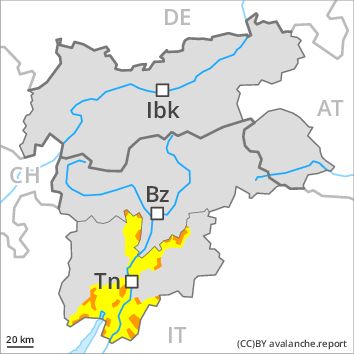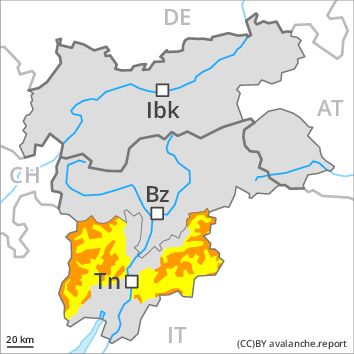Regions
Prealps, Cembra Valley, Bondone and Stivo, Vallarsa, Western Nonsberg Alps, Folgaria - Laverone, Ledro Valley, Latemar

Danger level
Danger Level 3 - Considerable above the treeline
Danger Level 2 - Moderate above the treeline
Avalanche Problem
Wind-drifted snow above the treeline, N-NE-E-SE-S-SW-W-NW

As a consequence of fresh snow and wind a critical avalanche situation will be encountered in some regions.
Wind slabs: As a consequence of fresh snow and a strong northerly wind, avalanche prone wind slabs will form above the tree line, in particular in gullies and bowls, and behind abrupt changes in the terrain at high altitudes and in high Alpine regions in all aspects. Even single winter sport participants can release avalanches easily, including large ones. Backcountry snowshoe touring also calls for extensive experience in the assessment of avalanche danger and careful route selection. A few natural avalanches are to be expected, in the regions exposed to a lot of wind in particular in the regions exposed to heavier precipitation and.
Snowpack
dp 6: cold, loose snow and wind
Over a wide area 30 to 50 cm of snow, and even more in some localities, fell, especially in the Dolomites. The sometimes strong wind will transport the fresh snow. The snowpack will be subject to considerable local variations.
Tendency
Slight decrease in avalanche danger as a consequence of the ceasing of precipitation.
Regions
Southern Adamello, Primiero - Pale di S. Martino, Adamello - Presanella, Northern Brenta - Peller, Southern Brenta, Fassa Valley, Sole, Pejo and Rabbi, Southern Lagorai, Northern Lagorai, Maddalene, Paganella, Marzola - Valsugana, Pine' - Mocheni Valley

Danger level
Danger Level 3 - Considerable above the treeline
Danger Level 2 - Moderate above the treeline
Avalanche Problem
Wind-drifted snow above the treeline, N-NE-E-SE-S-SW-W-NW

As a consequence of fresh snow and wind a critical avalanche situation will be encountered in some regions.
Wind slabs: As a consequence of fresh snow and a strong northerly wind, avalanche prone wind slabs will form above the tree line, in particular in gullies and bowls, and behind abrupt changes in the terrain at high altitudes and in high Alpine regions in all aspects. Even single winter sport participants can release avalanches easily, including large ones. Backcountry touring and other off-piste activities call for extensive experience in the assessment of avalanche danger and careful route selection. A few natural avalanches are to be expected, in the regions exposed to a lot of wind in particular in the regions exposed to heavier precipitation and.
Gliding avalanches: In the regions exposed to heavier precipitation there will be a gradual increase in the danger of gliding avalanches, in particular on steep south facing slopes below approximately 2000 m.
Snowpack
dp 6: cold, loose snow and wind
Over a wide area 30 to 60 cm of snow, and up to 70 cm in some localities, fell. The sometimes strong wind will transport the fresh snow. The fresh snow and wind slabs will be deposited on soft layers in all aspects. The snowpack will be subject to considerable local variations. Individual weak layers exist in the old snowpack in particular on steep shady slopes.
Tendency
Slight decrease in avalanche danger as a consequence of the ceasing of precipitation.


